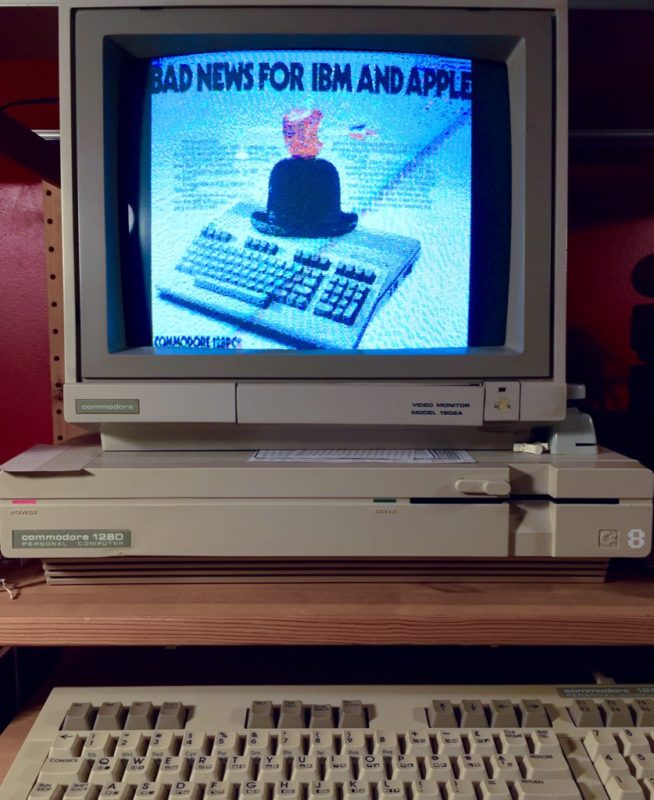
Did you recently get a new MS-DOS, KayPro IV, or Osborne 1 computer but no boot floppies?
If you have a Commodore 128 and a 1571 floppy drive, you might already know that you can read and write certain CP/M floppy formats while in CP/M mode. This is because the 1571 floppy drive can read and write two types of disk encoding schemes. GCR (Commodore, Apple, etc.) and MFM (common on CP/M and DOS platforms).
But so far, this has been limited to formatting disks and manipulating data at the file system level. Programs like Big Blue Reader and Super Sweep 128 allowed you to copy files between Commodore format and MS-DOS formatted floppies. This was a big step forward in compatibility at the time.
Today, there’s a need to create new floppies from disk images that you’ve downloaded. Most commonly, you’ve picked up a new computer and it didn’t come with any boot floppies and you don’t have access to a “tweener” PC (a PC that bridges the gap from the modern era to the 8-bit era, usually with the addition of a 5.25″ floppy drive). This was me recently so I decided to develop a way to write 5.25″ MFM floppy disk images for a number of platforms using a Commodore 128 and 1571 floppy drive.
To start, I located an article titled “1571 Utility Package” written by Dick Smit in Compute! Magazine, July 1987. The article contained a couple of type-in programs that created a toolkit for manipulating MFM disks. I built on top of this toolkit and created a suite of programs to make disk images for the following:
- MS-DOS 360k (2 sides, 40 tracks/side, 9 sectors/track, 368,640 bytes)
- KayPro IV (2 sides, 40 tracks/side, 10 sectors/track, 409,728 bytes)
- Osborne 1 Double Density (1 side, 40 tracks, 5 sectors/track, 204,800 bytes)
Download The 1571 MFM Disk Image Writer
The 1571 MFM Disk Image Writer Toolkit is available as a .D64 disk image. (Download .D64, 175KB)
What’s Needed
To get started, you’ll need the following:
- Input disk images must be “RAW” or “DSK” format and must be exactly the right number of bytes in file size as listed above. “RAW” format has no additional data in it, only raw sector contents in the right order.
- Commodore 128
- Commodore 1571 Floppy Disk Drive set as device 8
- SD2IEC or other mass storage device to hold disk images set to device 9 or higher)
- JiffyDOS is optional, but may improve write speeds
Making a Disk From a Disk Image
- Copy the 1571 MFM Tools disk image or copy the files from the disk image to your SD card and insert into your SD2IEC.
- Start the program by typing RUN”START”,U9
- At the menu, choose which type of disk image you want to make.
- At “FILENAME?” prompt, enter the disk image name and then device number where the image is located at “DEVICE NUM?” prompt.
- Insert your destination disk into the 1571 drive (device 8) and hit enter.
- The disk will be formatted and then the disk image will be written. Progress is shown on screen.
Brian
January 16, 2020 at 9:58amThis is neat. I had a couple of questions:
1. Any way to adapt this to work on a C64 w/ 1571?
2. Have you considered publishing the source code for others to learn from (i.e. me 🙂
Scott
May 25, 2020 at 6:33pmThank you! This allowed me to create a set of DOS disks for my newly aquired IBM 5150 🙂
Kevin
July 14, 2022 at 11:37amAwesome. I packed the dos disk image in dot img format with your program in a d81 container. Fired up the 1581 with a gotek and success. Is there’s also a way to do the reverse? Take a floppy and create a dos img with it?
Matt
May 5, 2023 at 9:00pmDo you know of any utility that might make a TRSDOS boot disk for a TRS-80 Model 4p?
hitchhikr
October 8, 2023 at 2:32pmHi,
Maybe someone else could be interested, I made another script based on your work to create NEC PC-88 floppies.
The specifications of such disks are:
PC-8801 320k (2 sides, 40 tracks/side, 16 sectors/track, 256 bytes/sector, 327,680 bytes)
It would probably be useful for some others older 5″1/4 disk drives based machines.
url: https://www.hitchhikr.net/pc88-write.zip
Thanks for your effort,
f.